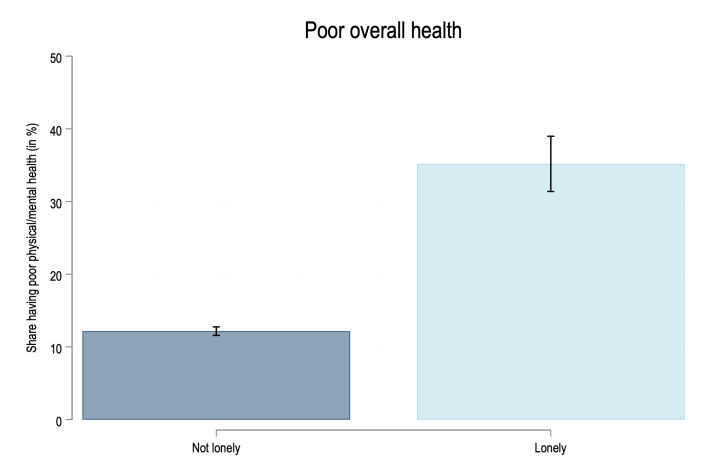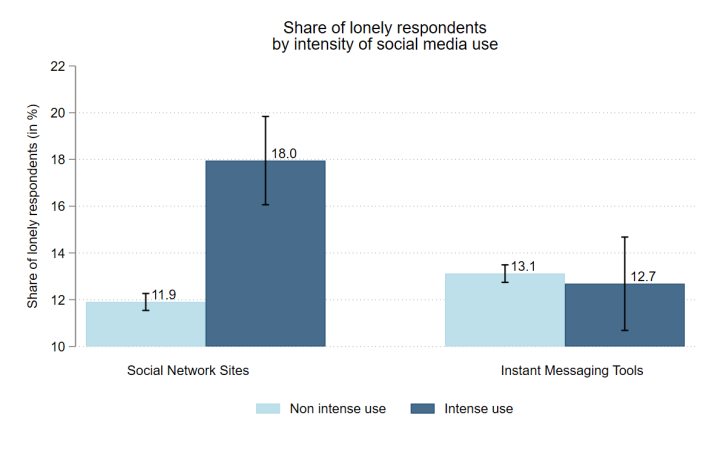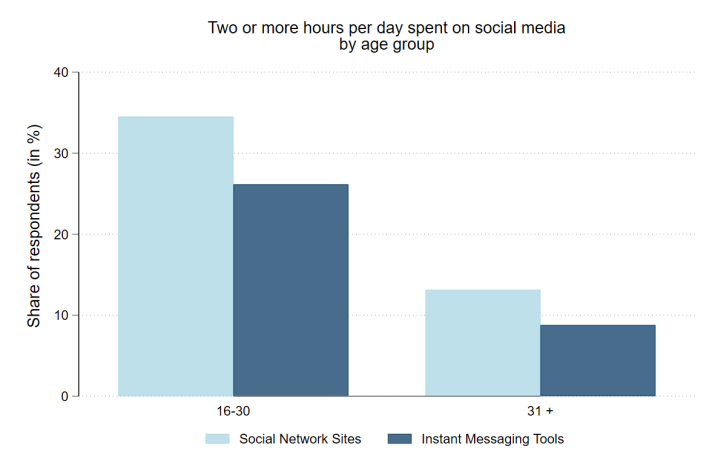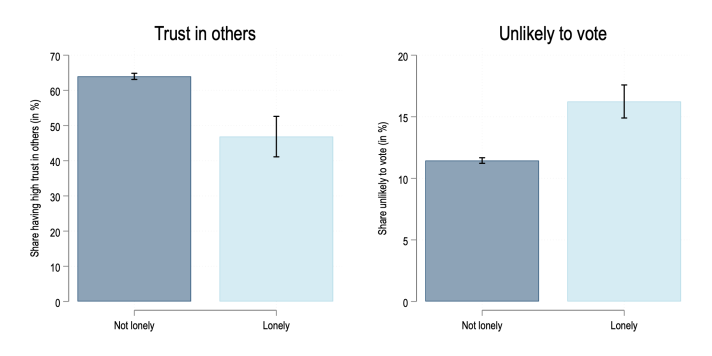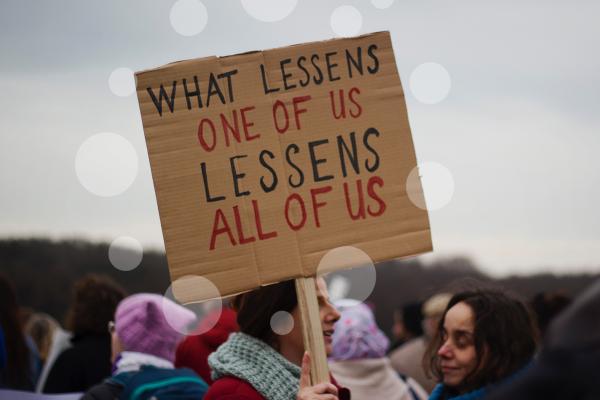Loneliness is widely recognized as one of the most significant health concerns for society today. The European Parliament pilot project carried out by the European Commission’s Joint Research Centre (JRC) in collaboration with the Directorate General for Employment, Social Affairs & Inclusion (DG EMPL), seeks to explore the risk factors for loneliness and the consequences loneliness can have in different areas of our lives.
In the context of this project, the first-ever EU-wide survey on loneliness (EU-LS) provides a detailed overview of loneliness in the European Union. Data on more than 25 000 Europeans was collected at the end of 2022 from an online consumer panel. The survey provides a detailed view of respondents’ health, social media use and social attitudes. The relationships between loneliness and these aspects are addressed below
Loneliness and health
The EU-LS provides evidence of the strong association between loneliness and poor mental and physical health.
Results show that individuals feeling lonely most or all of the time are three times as likely to assess their health status as poor. Lonely individuals are also more likely to be depressed and tend to engage more in unhealthy behaviours, such as smoking and having a poor diet.
This association underscores the importance of addressing loneliness as a public health concern given its wide implications on overall health and well-being.
Figure: The figure displays the share of respondents who assessed their overall health as poor by loneliness status. Poor overall health refers to reporting fairly poor or very poor when asked to assess own physical and mental health.
The estimates are based on a multivariate setting in which the socio-demographic characteristics of respondents (education, age, gender and country of residence) are accounted for. Respondents are classified as lonely if they felt lonely most or all of the time over the past four weeks preceding the survey.
There is well-documented negative association between loneliness and physical and mental health. Loneliness has been linked to a range of negative health outcomes, including a higher risk of depression, anxiety, suicidal ideation and suicide attempts, cardiovascular diseases, mobility limitations and cognitive decline. Furthermore, studies reveal that lonelier individuals are more likely to adopt riskier health behaviours and health practices (e.g., alcohol use and smoking) and fewer health-promoting behaviours (e.g., less physical activity, poor nutrition).
Several potential mechanisms have been proposed to explain the association between loneliness and health. Together with an increased likelihood of developing unhealthier lifestyles, worse sleep quality, and higher levels of stress, loneliness may influence biological markers of health, i.e., it may be related to a dysregulation of the neuroendocrine (hormonal) system and systemic inflammation.
Overall, the relationship between loneliness and health is complex in that there may be a potential reverse causality between the two. More specifically, some health conditions, particularly those that make people less likely to connect with others, have been linked to an increased risk of loneliness. Depression and anxiety are examples, as are poor physical health, limited mobility, hearing loss, and cognitive impairment. The fact that the relationship between loneliness and some health outcomes may be bidirectional is a major concern for researchers in the field as well as policymakers.
Consult the JRC literature review to know more about the link between loneliness and health.
[2022] Literature Review
Loneliness and social media use
The EU-LS shows a correlation between excessive use of social networking sites and feelings of loneliness, warranting further investigation into the potential impact of online social interactions on individuals' experiences of loneliness.
Intense use of social media - defined as spending 2 hours or more per day on social networking sites - is, on average, associated with an increase of 6.1 percentage points in the prevalence of loneliness. This finding is in line with the idea that social networking sites may contribute to a displacement of face-to-face interactions.
In contrast, intensive use of instant messaging tools does not appear to be significantly related to loneliness. These results remain consistent even when considering the quality and quantity of social networking activities, as well as the time spent on other digital tools.
Figure: The figure displays estimates of the share of lonely respondents by the intensity of social media use. The estimates are based on a multivariate setting in which the socio-demographic characteristics of respondents (education, age, gender and country of residence) are accounted for. Respondents are classified as lonely if they felt lonely most or all of the time over the past four weeks preceding the survey. Intense use means spending two or more hours per day on social media. Social network sites are online tools that let people create and exchange individual profiles (e.g. Instagram, TikTok, Twitter, Facebook). Instant messaging tools are online tools that let people talk to each other online privately and in real time (e.g. WhatsApp, MSN Messenger, SnapChat).
Approximately 34.5% of respondents aged 16-30 use social network sites two or more hours per day. In the same age cohort, 26.1% indicate that they spend two or more hours per day on instant messaging tools. In contrast, approximately 13% and 9% of respondents aged 31 years or older spend more than two hours per day on social networking sites and instant messaging tools, respectively. This suggests that younger individuals may be more exposed to a potential negative impact of an intensive use of social network sites.
Figure: The figure displays the share of respondents who reported spending two or more hours per day on social media. Respondents are classified as lonely if they felt lonely most or all of the time over the past four weeks preceding the survey.
The growing use of social media across the world has led to an unprecedented increase in interpersonal connectivity, enabling conversation, cooperation and the sharing of thoughts, images and ideas. This phenomenon has raised many questions related to the societal impact of social media.
Social media can help establish new relationships or foster existing ones without being restricted by physical distance. As such, it can reduce loneliness by enhancing current relationships and promoting new ones. Conversely, people who engage on social media might experience higher levels of loneliness because they substitute offline relationships with online ones that lack the intimacy and quality of offline relationships. The active or passive mode of social media and the type of social media tool (e.g. text or image-based tool) can affect the link between loneliness and social media consumption.
Furthermore, loneliness can also affect how and how often people use social media. In other words, it is unclear to what extent loneliness is a cause or a consequence of problematic social media use.
Consult the JRC literature review to know more about the link between loneliness and social media use.
[2022] Literature Review
Loneliness as a social issue
The EU-LS finds that lonely individuals are more likely to exhibit reduced trust in and to withdraw from political participation. Those feeling lonely are less likely to trust others (-27%) and more likely to not vote (+42%). Addressing loneliness may therefore help to promote civic engagement and social cohesion in communities.
Figure: The figure on the left displays trust levels of respondents by loneliness status. Trust is measured using the question “In general how much do you trust most people?” on the scale from 1 to 10. Trusting individuals are those reporting scores above 5.
The figure on the right displays the share of respondents who are unlikely to vote by loneliness status. Respondents defined as unlikely to vote are those who have chosen “most likely I wouldn’t vote” as the answer to the question “If there were a general election tomorrow, which party would you support?”.
The estimates are based on a multivariate setting in which the socio-demographic characteristics of respondents (education, age, gender and country of residence) are accounted for. Respondents are classified as lonely if they felt lonely most or all of the time over the past four weeks preceding the survey.
Social capital encompasses the resources and advantages that individuals can access through their relationships. It is built through trust, social interactions, shared cultural norms and values, which can be fostered through activities like volunteering and participating in community events, church attendance.
There is some evidence to suggest that social capital can play a role in reducing feelings of loneliness as having strong social connections and access to social support can provide individuals with a sense of belonging and connectedness. But social norms and values prevalent in a given society and the extent to which a society enforces them may have a negative effect as individuals may feel pressure to conform to these norms, which can lead to feelings of isolation or disconnection if they don't fit in. Loneliness may lead individuals to withdraw from social interactions and become less attuned to the needs and emotions of others.
The relationship between loneliness and prosociality (altruism, volunteering, engaging in charitable giving) is complex and may depend on a range of factors, such as individual differences in personality and cultural norms. Engaging in prosocial behaviour may help to alleviate loneliness because it is a way to connect with others, it may also provide individuals with a sense of purpose and belonging, which can help to counteract feelings of loneliness.
Research has found loneliness is associated with a decreased likelihood of political participation, including voting. Individuals who report higher levels of loneliness may be less likely to participate in political activities compared to those who are not lonely. Loneliness may lead individuals to feel disengaged from society and less motivated to participate in civic activities.
Consult the JRC literature review to know more about the link between loneliness and social and civic behaviours.

